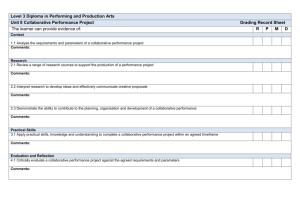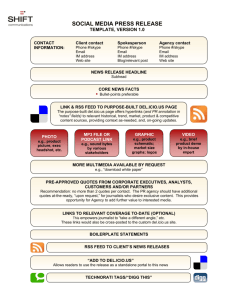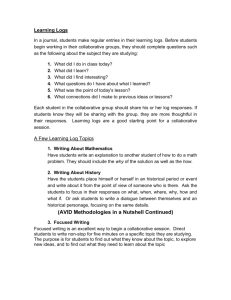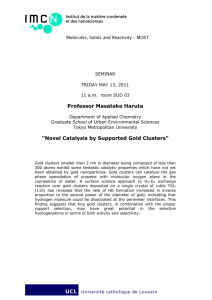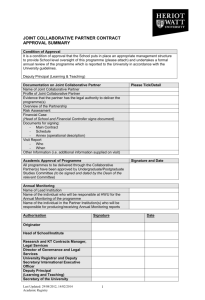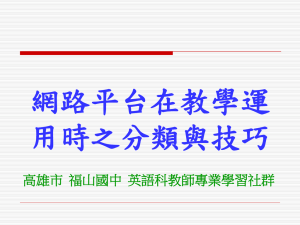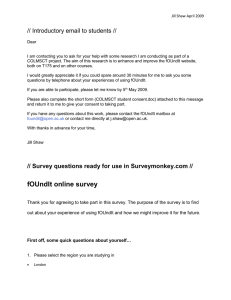Exploring the Library and Learning Resources Centre
advertisement
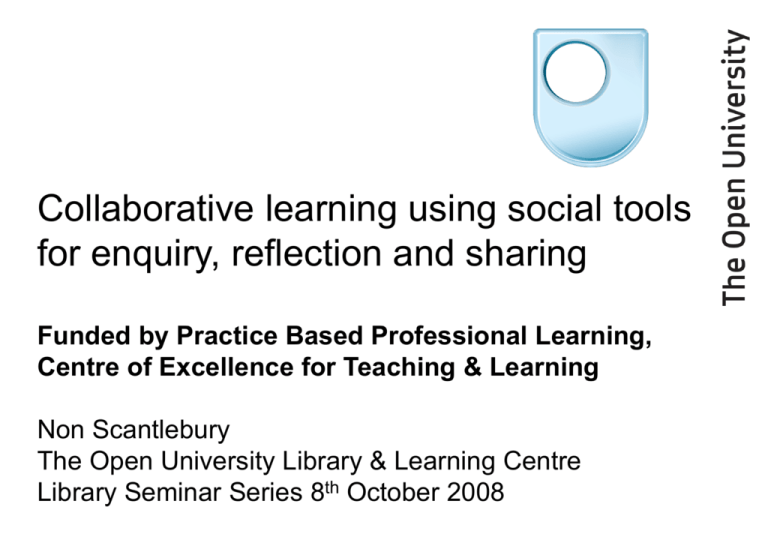
Collaborative learning using social tools for enquiry, reflection and sharing Funded by Practice Based Professional Learning, Centre of Excellence for Teaching & Learning Non Scantlebury The Open University Library & Learning Centre Library Seminar Series 8th October 2008 CLUSTERS project Project duration June- November 2007 Participants 7 Associate Lecturers, Regional and Academic Staff 11 Librarians Aims To investigate the potential of social networking tools to facilitate collaborative practice-based learning CLUSTERS objectives Undertake “hands on” investigation of social tools and evaluate • The relevance of the concept of “user generated content” for practitioners developing and sharing knowledge • How practitioners can work collaboratively to advance practice knowledge using freely available social networking tools • An ‘empty box’ model of learning in which participants negotiate a topic of interest and build their own collaborative learning Discover something new Associate lecturers wanted to investigate…… “how tutors could seek to review and improve how they tutor, through formal and informal feedback and also through engaging in discussion with colleagues to exchange tips, share best practice, discuss issues.” Librarians wanted to investigate….. “the application of interactive, collaborative and multi-media based technologies to webbased library services and collections” (Maness, 2006) Maness, J.M. (2006) Library 2.0 theory:Web 2.0 and its implications for libraries. Available from http://www.webology.ir/2006/v3n2/a25.html CLUSTERS toolkit – PB Wiki – Flashmeeting http://pbwiki.com/education.wiki http://flashmeeting.open.ac.uk – Del.icio.us – Ning – Facebook – fOUndit http://del.icio.us/ http://www.ning.com/ http://www.facebook.com/ http://foundit.open.ac.uk/Pligg/ CLUSTERS evaluation Qualitative data: • • • • • Wiki contributions Del.icio.us library Flashmeeting dialogue/transcriptions Comments within Facebook and Ning Questionnaires The CLUSTERS constellation! Key issues which emerged • Knowledge Management (self selection, critical evaluation) • Identity Management (need for guidance) • Technological Limitations (need good support) • Enthusiasm and open to online group work (strong and weak links) • Balancing physical and virtual presence • Broadening reflective practice (expert, generalist and the grasshopper!) Project outcomes • New collaborative publishing opportunities • Seeding enthusiasm in use of tools for sharing good professional practice (tagging, sharing and rating) • Experimentation of blogging with students • Engagement with Library 2.0 initiatives –raised the Library’s profile • Funding for further practice based research (Social Networking for Practice Based Learning) Collect, Organise and Share Follow on project..Social Networking for Practice Learning Project manager: P.J.Greaney@open.ac.uk Issues with using social tools? • Are you using any social tools currently to support you in your work or professional development? • If so how? • What are the key challenges to us adopting these tools in a work related context? • Can we realistically continue to segregate our work/personal/professional lives in the Web 2.0/Web 3.0 worlds? Issues for librarians and others • finding help for effective Information and Knowledge Management in ‘social networking contexts’ • being “snappy” for the ‘lazy web user” • moderation, mediation or organic? • changing practice in instructional design (how interactive is your learning?) • effective IPR in social learning spaces • technological determinism v user benefits (eg.Twitterextending sphere of influence or ‘white noise’?)) • needing to be where the users are • Broader information infrastructural needs for distance online learning -not everything needing to be ‘miscellaneous’! http://library20.ning.com/ Next steps?? • Collaborative vision for SociaLearn • The Open University’s Broadcast Strategy Review • Project Bamboo • Library websites and personalisation • More cross domain working! Thank you for listening!
